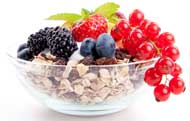





1. Raisin Facts
2. Types of Raisins
3. Nutritional Value of Raisins
4. Health Benefits of Raisins
Raisin (Vitis vinifera) is a dried grape, which are dried in the sun or through mechanical processes, which causes them to shrink and darken, losing most of their water content to become chewy, sweet, and concentrated.
Grapes are harvested when ripe, and then dried for several weeks to a few days, depending on the method. The size, colour, and taste of a raisin depend on the grape variety used and the drying method.
Raisin varieties depend on the types of grapes used and appear in a variety of sizes and colours, including green, black, brown, purple, blue, and yellow. Seedless varieties include sultanas (the common American type is known as Thompson Seedless in the United States), Zante currants (black Corinthian raisins, Vitis vinifera L. var. Apyrena), and Flame grapes. Raisins are traditionally sun-dried but may also be artificially dehydrated.
Golden raisins are created with a treatment of sulphur dioxide rather than purely drying them. They are sometimes dried in dehydrators with controlled temperature and humidity, which may allow them to retain more moisture at an added cost of running the dehydrator.
In parts of the world, the term "raisin" is sometimes used specifically for dark-coloured dried grapes, while other terms like "sultana" refer to golden-coloured varieties and "currant" to dried small black Corinth grapes. In the US, the "Thompson Seedless" variety is commonly used.
History and Origin
Raisins originated in the ancient Near East and Mediterranean region around 2000 BCE, with early records in Persia and Egypt. They spread through trade via the Phoenicians and became a valued commodity for Greeks and Romans.
Grapes were dried into raisins in ancient Persia and Egypt as early as 2000 BCE. The practice likely began shortly after humans started making wine around 6000 BCE in Georgia.
Dried grapes are also mentioned in the Bible, with King David receiving "a hundred clusters of raisins" as a gift sometime between 1110 and 1070 BCE.
Greek and Roman - Greeks and Romans prized raisins, using them to adorn places of worship, as prizes in sporting events, and as a form of currency to pay for goods and services.
Spread to Europe - Increased trade in the 11th century AD brought raisins to Northern Europe, where they became a staple in kitchens during the medieval period.
The main types of Australian dried grapes are Sultanas (including Thompson Seedless), Currants (such as Carina and Black Gem), Raisins (made from Muscat Gordo Blanco), and Sunmuscats. Each variety is distinct, from the golden and sweet sultanas to the tangy currants and the larger-seeded raisins.
Main types of Australian dried grapes
Sultanas: These are the most common and are harvested early in the season. They are sweet and golden and include varieties like Thompson Seedless, Merbein Seedless, Selma Pete, and the newer Sunglo.
Currants: Small, dark, and tangy, these are made from varieties like Carina and Black Gem. The Carina variety was developed in Australia and is known for high yields.
Raisins: These are made from larger, seedy grapes, with Muscat Gordo Blanco being the most common variety. They are harvested later in the season and have a muscat flavour.
Sunmuscats: A newer, popular type of sultana-like grape that has a muscat flavour. They are a large, honey-coloured berry and are unique to Australia
Fruit ” Raisin ” ( Nutritional value )
Nutritional value per 100 g
Raisins, golden seedless
|
Nutrient ( Proximate’s )
|
Unit
|
Value
|
Daily Value %
|
|
Energy
|
kcal
|
302
|
15.1%
|
|
Protein
|
g
|
3.39
|
6.7%
|
|
Total lipid (fat)
|
g
|
0.46
|
0.5%
|
|
Carbohydrate, by difference
|
g
|
79.52
|
28.9%
|
|
Fiber, total dietary
|
g
|
4.0
|
16%
|
|
Sugars, total
|
g
|
59.19
|
|
|
Minerals
|
|||
|
Calcium, Ca
|
mg
|
53
|
4%
|
|
Iron, Fe
|
mg
|
1.79
|
9.9%
|
|
Magnesium, Mg
|
mg
|
35
|
8.3%
|
|
Phosphorus, P
|
mg
|
115
|
9.2%
|
|
Potassium, K
|
mg
|
746
|
15.8.3%
|
|
Sodium, Na
|
mg
|
12
|
0.5%
|
|
Zinc, Zn
|
mg
|
0.32
|
2.9%
|
|
Copper, Cu
|
mg
|
0.363
|
40.3%
|
|
Manganese, Mn
|
mg
|
0.308
|
13.3%
|
|
Selenium, Se
|
mcg
|
0.7
|
1.2%
|
|
Vitamins
|
|||
|
Vitamin C, total ascorbic acid
|
mg
|
3.2
|
3.5%
|
|
Thiamin (B-1)
|
mg
|
0.008
|
0.6%
|
|
Riboflavin (B-2)
|
mg
|
0.191
|
14.6%
|
|
Niacin (B-3)
|
mg
|
1.142
|
8.8%
|
|
Pantothenic acid (B-5)
|
mg
|
0.140
|
2.8%
|
|
Vitamin B-6
|
mg
|
0.323
|
19%
|
|
Vitamin B-12
|
mg
|
0.00
|
|
|
Folate DFE (dietary folate) (B-9)
|
mcg
|
3
|
0.7%
|
|
Vitamin A, RAE (retinol)
|
mcg
|
0
|
|
|
Vitamin E (alpha-tocopherol)
|
mg
|
0.12
|
0.8%
|
|
Vitamin D (D2 + D3)
|
mcg
|
0
|
|
|
Vitamin K (phylloquinone)
|
mcg
|
3.5
|
2.9%
|
|
Lipids
|
|||
|
Saturated Fatty Acids
|
g
|
0.151
|
0.7%
|
|
Monounsaturated Fatty Acids
|
g
|
0.019
|
|
|
Polyunsaturated Fatty Acids
|
g
|
0.135
|
|
|
Trans Fatty Acids
|
g
|
0.000
|
|
|
Carotenoids
|
|||
|
Beta-Carotene
|
mcg
|
0
|
|
|
Beta-Cryptoxanthin
|
mcg
|
0
|
|
|
Lutein + zeaxanthin
|
mcg
|
0
|
|

|
Reference Values are based on a 2,000 Calorie Intake, for Adults and Children 4 or More Years of Age. Your daily values may be higher or lower depending on your calorie needs.
|
|
Percentages are roughly approximated using (RDA) Recommended Dietary Allowances for adults. Source: Nutrient Database – USDA (United States Department of Agriculture)
|
|
Reference Values for Nutrition – FDA U.S. Food and Drug Administration
|
Raisin Nutritional Value
Raisins are beneficial for health because they are rich in antioxidants, fiber, and essential minerals. They support heart health by lowering blood pressure and cholesterol, aid digestion by promoting bowel regularity, and can help prevent anaemia due to their iron content. Additionally, raisins may support bone health with calcium and boron, protect eye health with antioxidants, and maintain oral health by inhibiting cavity-causing bacteria.
- DIGESTIVE AND METABOLIC HEALTH
Raisins benefit digestive and metabolic health due to their fiber, polyphenols, and other nutrients. They support digestion by promoting bowel regularity and a healthy gut microbiome, while their fiber and antioxidants help with metabolic health by improving blood lipids, blood pressure, and glucose control. - PROMOTES A HEALTHY MOUTH
Raisins may promote a healthy mouth by containing phytochemicals, such as oleanolic acid, that fight bacteria responsible for cavities and gum disease. These compounds can help inhibit the growth of bacteria like Streptococcus mutans (cavities) and Porphyromonas gingivitis (gum disease). Additionally, chewing raisins can stimulate saliva production, which helps cleanse the mouth. - PROTECTS EYE HEALTH
Raisins protect eye health by providing antioxidants like polyphenols that combat oxidative stress and inflammation, while vitamins and minerals such as vitamin A and potassium help maintain retina and blood vessel health. This can help prevent damage and support good vision into old age. - MAY HELP MANAGE BLOOD SUGAR
Raisins may help manage blood sugar when eaten in moderation as part of a balanced diet, despite their sugar content. Studies show that raisins have a low-to-moderate glycaemic index (GI) and can help reduce post-meal blood sugar spikes compared to high-GI foods like white bread. Raisins are also rich in fiber, antioxidants, and potassium, which can support overall metabolic health.

- MAY PREVENT ANAEMIA
Raisins may help prevent anaemia because they are a good source of iron, which is essential for creating red blood cells. Iron in raisins helps the body make haemoglobin and red blood cells that carry oxygen to the body's cells. - BUILDS STRONG BONES
Raisins can help build strong bones because they are a good source of calcium, magnesium, and the trace mineral boron. These nutrients are essential for bone health, as calcium and magnesium support bone structure and density, while boron helps the body utilize calcium and vitamin D to maintain bone health. - SUPPORTS CARDIOVASCULAR HEALTH
Raisins support cardiovascular health by providing fiber, potassium, and antioxidants, which help lower blood pressure, reduce bad cholesterol (LDL) and decrease inflammation. The high fiber and antioxidant content can contribute to better heart health by managing blood lipids and blood sugar levels, as well as reducing the risk of heart disease. - FIGHTS OXIDATIVE DAMAGE
Raisins fight oxidative damage due to their high content of antioxidants, such as polyphenols, flavonoids, and phenolic acids. These compounds neutralize harmful free radicals in the body, which helps prevent oxidative stress, a condition linked to aging and chronic diseases. Studies have shown that the body can use the antioxidants in raisins efficiently, providing a quantifiable boost to antioxidant levels in the bloodstream.
References
Nutrient Database – USDA (United States Department of Agriculture)
Reference Values for Nutrition – FDA U.S. Food and Drug Administration
Digestive and metabolic health – Raisins benefit digestive and metabolic health due to their fiber, polyphenols, and other nutrients. They support digestion by promoting bowel regularity and a healthy gut microbiome, while their fiber and antioxidants help with metabolic health by improving blood lipids, blood pressure, and glucose control.
May prevent anaemia - Raisins may help prevent anaemia because they are a good source of iron, which is essential for creating red blood cells. Iron in raisins helps the body make haemoglobin and red blood cells that carry oxygen to the body's cells.
Supports cardiovascular health - Raisins support cardiovascular health by providing fiber, potassium, and antioxidants, which help lower blood pressure, reduce bad cholesterol (LDL) and decrease inflammation. The high fiber and antioxidant content can contribute to better heart health by managing blood lipids and blood sugar levels, as well as reducing the risk of heart disease.
May help manage blood sugar - Raisins may help manage blood sugar when eaten in moderation as part of a balanced diet, despite their sugar content. Studies show that raisins have a low-to-moderate glycaemic index (GI) and can help reduce post-meal blood sugar spikes compared to high-GI foods like white bread. Raisins are also rich in fiber, antioxidants, and potassium, which can support overall metabolic health.
Builds strong bones - Raisins can help build strong bones because they are a good source of calcium, magnesium, and the trace mineral boron. These nutrients are essential for bone health, as calcium and magnesium support bone structure and density, while boron helps the body utilize calcium and vitamin D to maintain bone health.
Protects eye health - Raisins protect eye health by providing antioxidants like polyphenols that combat oxidative stress and inflammation, while vitamins and minerals such as vitamin A and potassium help maintain retina and blood vessel health. This can help prevent damage and support good vision into old age.
Promotes a healthy mouth - Raisins may promote a healthy mouth by containing phytochemicals, such as oleanolic acid, that fight bacteria responsible for cavities and gum disease. These compounds can help inhibit the growth of bacteria like Streptococcus mutans (cavities) and Porphyromonas gingivitis (gum disease). Additionally, chewing raisins can stimulate saliva production, which helps cleanse the mouth.
Fights oxidative damage - Raisins fight oxidative damage due to their high content of antioxidants, such as polyphenols, flavonoids, and phenolic acids. These compounds neutralize harmful free radicals in the body, which helps prevent oxidative stress, a condition linked to aging and chronic diseases. Studies have shown that the body can use the antioxidants in raisins efficiently, providing a quantifiable boost to antioxidant levels in the bloodstream.
